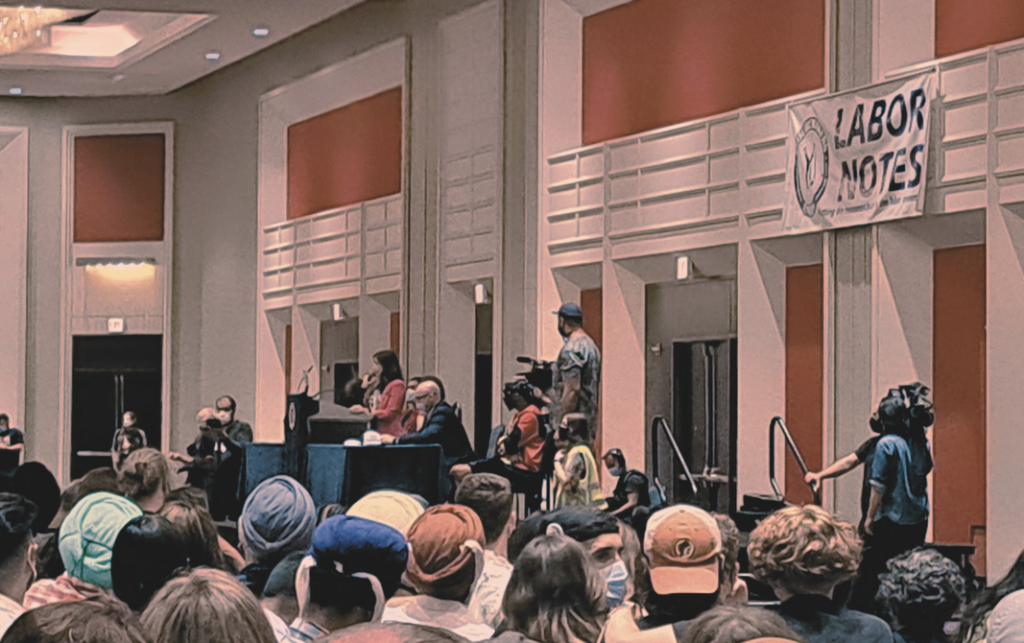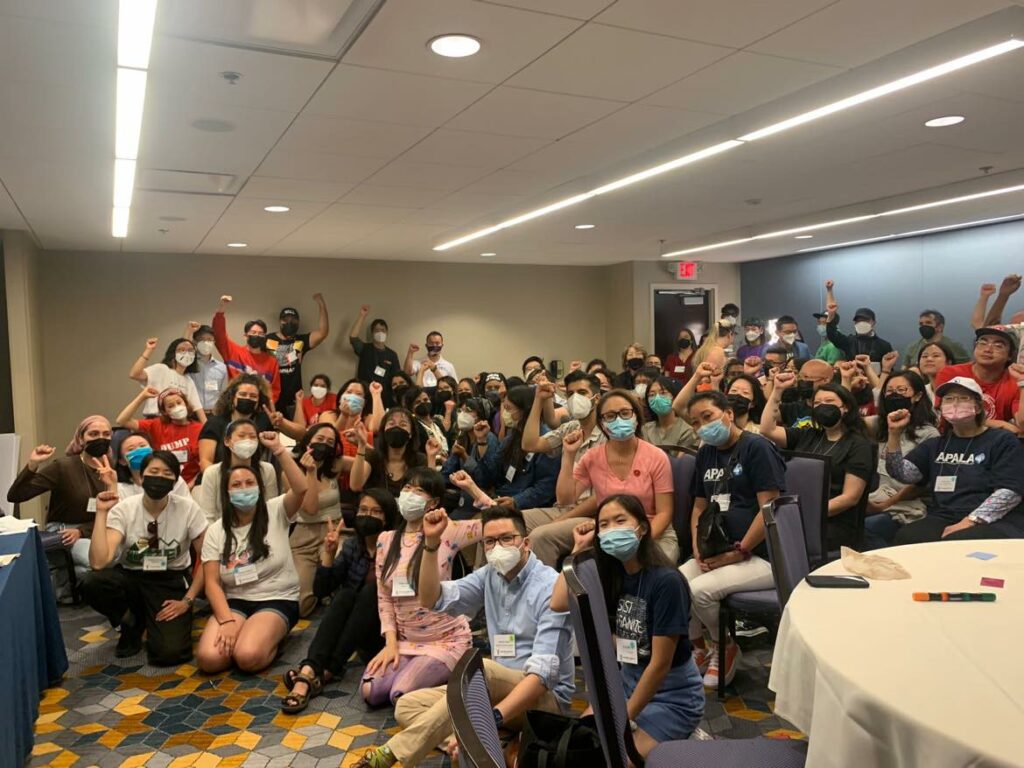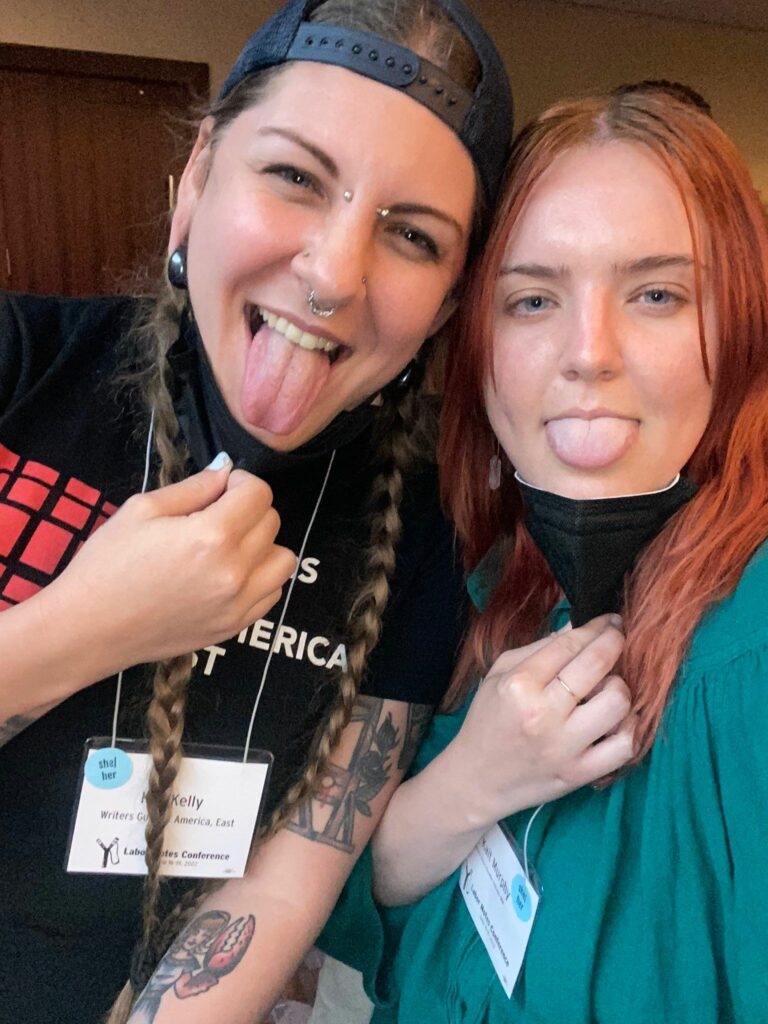
There is something inherently empowering about being surrounded by folks who “get it.” The Hyatt Regency at O’Hare Airport, host of the 2022 Labor Notes Conference, was not occupied by the disillusioned or hopeless—chickens without heads. Organizers, educators, activists, rank-and-file union members, and those simply hoping to learn more about organized labor swarmed Chicago in unprecedented numbers in a show of strength and revival for the long-dormant American labor movement.
I caught a 6 AM flight out of New York after an absolutely dreadful bout of last minute packing that ended with the cutting off of one of my shoelaces outside of Laguardia Airport. I simply could not untie the previous knot and was running the risk of missing the flight. The airport staff workers enjoyed the performance as I staggered through the entrance. This initial headache was immediately alleviated upon my arrival. I spied union shirts left and right—Teamsters, UAW, CWA, SEIU, etc. I was among fellow workers, comrades—toilers. Chicago, home of Haymarket and the burying grounds of its martyrs, once again belonged to the toilers.
I was dressed up, full suit and tie. I refuse to cede the grounds of style to the wealthy. I took that mentality from my adoption of the mod subculture as a kid. “Clean living under difficult circumstances” was the credo, one which had always been relevant to me as a member of the working class. Most everyone else opted for a more casual look consisting of union t-shirts and comfortable shorts. I assume most thought I was a lawyer. My Industrial Workers of the World pin that hung off of my lapel was too small to alleviate those fears.
The most inspiring aspect of the conference for me was the amount of young faces that made up the mass of attendees. We were the majority, the new generation of labor’s soldiers taking up their positions on the barricades and digging in at the trenches—picking up where others left off. The elders were not angered at this sight. It was just the opposite. They wore smiles on their faces weathered by years of struggle and hardship, their own stories fading into the past and connected to the present only by what Utah Phillip’s described as the working class’ greatest weapon, “the long memory.”
In the workshops, we exchanged stories, jokes, observations, and fears. Tears were shed in moments of vulnerability and joy. Anger took center stage, a shared anger that propelled us all toward Chicago. It was almost an involuntary feeling, we knew we had to be there. We connected, shared our contact information, exchanged gear and buttons, swore to be there in solidarity for each other. Solidarity was the name of the game.
I spent every moment between workshops trying to spy the familiar imagery of the IWW globe or the beloved black cat known as Sabo-Tabby. The Wobbly footprint on labor at-large could be felt everywhere. Our mottos such as “an injury to one is an injury to all” colored the speeches of speakers. The image of Sabo-Tabby and calls for a general strike were plastered on shirts and buttons. I scanned the crowd for Wobblies, knowing that there were likely hundreds in attendance but most of us were unlikely to be too visible about it.
My main worry was that this new wave of the movement would be too willing to follow the trends of the previous generation which sought reconciliation with the employing class rather than their usurping by the working class. This fear was alleviated in short order—militancy was as present in the air as the humidity of the oppressively hot Chicago summer.
Even the leaders of standard-bearers for more traditional approaches to organized labor, such as President of the International Brotherhood of Teamsters Sean O’Brien, seemed to take cues from “Big Bill” Haywood and Elizabeth Gurley Flynn in their speeches to the gathered conference. O’Brien, with his thick New England accent, captured the attitude of this reinvigorated movement as one of a scrappy street fighter, warning the bosses that they’d need to “tighten their chin straps” and to “ice up.” We were all no longer interested in reconciliation and negotiations with the bosses—we’re demanding their unconditional surrender.

Saturday night, while attending a reception for the folks in DSA’s Emergency Workplace Organizing Committee, I spotted someone wearing an IWW hoodie. I turned around to point it out to a friend but when I went to go speak to them they had already disappeared. Resigned to having only spoken to my fellow workers from the New York GMB, I was prepared to leave Chicago without meeting other members of the One Big Union. But, as it happens sometimes, a stroke of good luck occurred when I ran into the individual again in the hallway. They asked how I came to join the union and sign up for my red card. After introductions were over, they brought me to a balcony that had been occupied by our fellow workers, an un-official Wobbly caucus.
It was already midnight so I didn’t get to chat for long but it was refreshing to meet and talk with others in our union, to share the stories and struggles from our respective parts of the country. To celebrate together the return of labor militancy and the rise of a new movement, a movement owing much to our rebellious industrial union that started in this very city.
Sunday came and went. The conference ended at 2 PM. At the conclusion of the day’s main session, in which the 4,000 attendees of the conference flooded into the Regency’s Grand Ballroom, the collected troublemakers sang a verse and chorus from Wobbly Ralph Chaplin’s “Solidarity Forever,” the anthem of our movement.
“When the union’s inspiration through the workers blood shall run,
There can be no power greater anywhere beneath the sun,
Yet what force on Earth is weaker than the feeble force of one,
But the union makes us strong.”
The influence of the IWW was felt in Chicago, whether all of our fellow troublemakers realized it or not. Chicago is no stranger to the ashes of the old world. That weekend, it was at the forefront of the new one.
The moment everyone was dreading arrived; the conference concluded. Parting wishes and hugs were exchanged and proposals for future meetings were planned. I said goodbye to the friends I had made over the course of the conference and the fellow workers who were heading back to continue the struggle for the One Big Union.
I arrived back at O’Hare for an 8:30 flight to the city that never sleeps, my home. My bag, packed to the brim with books and union gear, nearly broke my back as I got it into the overhead bins. I settled in with my book and slid open the window cover to watch the distant city disappear over the horizon. The sun was going down over Chicago and began to paint the sky a most beautiful color—red.
I hummed along and recalled the lyric’s to Joe Hill’s underappreciated composition, “Workers of the World, Awaken!”
“Workers of the world, awaken!
Rise in all your splendid might;
Take the wealth that you are making —
It belongs to you by right.
No one for bread will be crying,
We’ll have freedom, love and health,
When the grand red flag is flying
O’er the Worker’s commonwealth.”
The world feels as though it’s unraveling. People’s very autonomy is being challenged. The Earth is struggling against the full brunt of unbridled capitalism. People are losing trust in each other and the systems we foolishly believed belonged to us. People are hurting, people are dying. Unity seems to be a foreign concept.
At this conference, there was unity. There was trust. There was solidarity and mutual empowerment. Organized labor is our only avenue to bring about the new world we speak of so dearly—the world in which trust is restored and the masses can live in harmony with the planet. A better world is possible. That ain’t “pie in the sky.”
We cannot simply be nostalgic for a glorious history and continue to look to the words of leaders long past. The IWW and the fight for the One Big Union never went away. We were simply licking our wounds. We have a duty to take part in this current struggle and ensure that the work of those that came before us serves as inspiration for the fight ahead and the victory that we will undoubtedly achieve. We can’t look to the past; we need to build a new future. Fellow Workers, let’s get to work.

